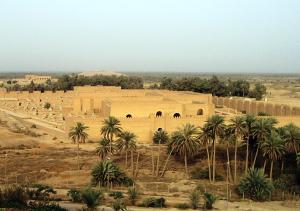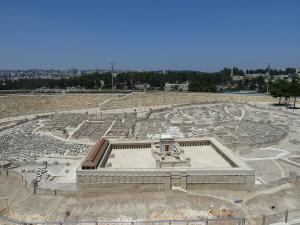(Lectionary for February 18, 2018)
 I am always glad when this wonderful text streams into view; fortunately it does so quite regularly in the Common Lectionary. It is simply chock full of great preaching bits that can energize any proclaimer to a deeper reflection. In this essay, I wish to concentrate on the very first two verses of the pericope (Is.43:18-19).
I am always glad when this wonderful text streams into view; fortunately it does so quite regularly in the Common Lectionary. It is simply chock full of great preaching bits that can energize any proclaimer to a deeper reflection. In this essay, I wish to concentrate on the very first two verses of the pericope (Is.43:18-19).
Do not remember the former things, nor reflect on old things.
Watch! I am doing something new!
It springs up now; don’t you see it?
I am placing a road in the wilderness, rivers in the desert.
It is difficult to overestimate the radical nature of these words out of the mouth of the prophet of the exile. But we would do well to think with him about this matter of the past and the present, because we, too, are fraught in our own time with issues just like this. In an era in our country when the past is neglected and/or altered, and when the present is debased as an occasion for anyone to make up what he or she thinks is appropriate to do and say, regardless of what anyone else does or says, or when attempts to suggest such behaviors are wrong or humanly unworthy are rebuffed or ridiculed, it is important for us to think again about the complex relationships between past and present. I only here scratch the surface of a profound subject.
Isaiah 43:18 is astonishing in the light of the vast importance that the Hebrew Bible always places on the past. It could well be said that the faith of Israel was based squarely on the proper memory of what YHWH has done for Israel, from creation to Exodus to Promised Land to Torah. God is known primarily by ongoing actions with and for Israel, and whenever the people forget their God, as the prophets warn over and again, disaster strikes, as it did in the exile to Babylon. Yet, here is the prophet of that very exile urging his hearers not to “remember the former things.” What? It is as if Isaiah is asking them to deny the essence of their faith in their God, a God who seemed in Babylon to many of them to have forgotten them completely. The word the prophet uses for “former things” comes from the physical word for “head,” and is regularly used for “first,” hence “earlier,” actions and events of former times. And in the second line of vs.18, he employs a word that is used for a physical placement, usually in the east. In its prepositional form it means “over against” or “near.” Its expanded meaning becomes “older” or again “earlier.” Isaiah perhaps is not urging the people to forget YHWH’s great works in the distant past, but rather suggests that they not dwell on the immediate actions they have attributed to YHWH before the exile. Those terrible memories of the destruction of their beloved Jerusalem, the dishonoring of their king and the murder of his family, the long, painful trek to the city of Babylon, and their lengthy imprisonment in the foreign land— those memories need to be forgotten!

YHWH is in the process of doing something new and amazing. When they return to Jerusalem—yes, they are about to return!—they will not walk an aimless and uncharted trail, but will find an actual road, a super highway straight through the blasted wilderness that leads directly to their holy city. And even more than that, their trip will be accompanied not by endless mounds of sand and drought, but by rivers in the desert, deep pools that will make the journey pleasant and comfortable. YHWH is always capable of acting in ways unanticipated, ways not bounded by YHWH’s works in the past.
And right there is the reason for Isaiah’s demand that old and former things simply must be forgotten, because the God of Israel is a God of the new. If one awaits just more of the same from this God, one’s understanding is too small, too limited. The return to Jerusalem will not merely be an exile in reverse, a sorry hike back through the same horrifying desert to a ruined city. There will be joy and gladness this time, because YHWH is that sort of God!
But we must be careful about this call to forget the past. The past is not so easily put aside. When some religious mountebanks urge us to “get on with our lives” and simply “forget where we have been,” we all know deep down that our past is at least in part who we are. We wrestle with our past, for good and ill, all the time; it is not to be set aside in order for us to “live for the now.” Isaiah himself knows this truth, since he precedes his admonition to forget with a clear demand to remember! “Thus says YHWH, who makes a way in the sea, a path in the mighty waters, who brings out chariot and horse, army and warrior; they lie down, they cannot get up; they are extinguished, quenched like a wick” (Is. 43:16-17)! This is an obvious reference to the mighty act of YHWH at the Sea of Reeds, the foundation story of the people of Israel, a tale that cannot, must not ever be forgotten. It is the central portion of the DNA of this people; without it they cannot be the people of YHWH at all. Surely, when Isaiah counsels forgetting the former things, he cannot mean that story!
 Yet, our past, and theirs, can be a stumbling block for the present and the future. To be stuck in the past can lead to terrible consequences. Consider Psalm 137, whose sad beginning in the sorrows of exile (vss.1-6), ends with a terrible demand to murder Babylonian babies as reprisal for that exile (vss.7-9). This psalmist was fixed in the past, anchored in a nostalgic dream of the former greatness of Jerusalem. His unwillingness to embrace his new exilic circumstances forced him to look for scapegoats for his state rather than to search for new ways to live and sing YHWH’s song in a new land. There are surely times when we need to forget our past and live in the present, just as surely as there are times when we need to remember our past in order to live more fully in the present. In short, we must remember to forget, but as importantly we must not forget to remember.
Yet, our past, and theirs, can be a stumbling block for the present and the future. To be stuck in the past can lead to terrible consequences. Consider Psalm 137, whose sad beginning in the sorrows of exile (vss.1-6), ends with a terrible demand to murder Babylonian babies as reprisal for that exile (vss.7-9). This psalmist was fixed in the past, anchored in a nostalgic dream of the former greatness of Jerusalem. His unwillingness to embrace his new exilic circumstances forced him to look for scapegoats for his state rather than to search for new ways to live and sing YHWH’s song in a new land. There are surely times when we need to forget our past and live in the present, just as surely as there are times when we need to remember our past in order to live more fully in the present. In short, we must remember to forget, but as importantly we must not forget to remember.
Each of us is given these twin tasks of forgetting and remembering, and the equally important task of determining when to do the one and the other. Christians must always remember the gifts of God to us, especially the gift of Jesus, but we also must forget those actions and speeches in our past that freeze us into hatred and rejection of our fellow human beings. Remembering to forget and forgetting to remember are lifelong tasks, daily demands that no one of us may avoid.
(Images from Wikimedia Commons)















